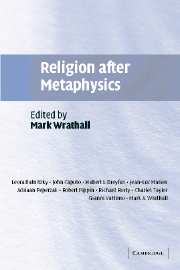Book contents
- Frontmatter
- Contents
- List of contributors
- Preface
- 1 Introduction: metaphysics and onto-theology
- 2 Love and death in Nietzsche
- 3 After onto-theology: philosophy between science and religion
- 4 Anti-clericalism and atheism
- 5 Closed world structures
- 6 Between the earth and the sky: Heidegger on life after the death of God
- 7 Christianity without onto-theology: Kierkegaard's account of the self's movement from despair to bliss
- 8 Religion after onto-theology?
- 9 The experience of God and the axiology of the impossible
- 10 Jewish philosophy after metaphysics
- 11 The “end of metaphysics” as a possibility
- Index
1 - Introduction: metaphysics and onto-theology
Published online by Cambridge University Press: 21 May 2010
- Frontmatter
- Contents
- List of contributors
- Preface
- 1 Introduction: metaphysics and onto-theology
- 2 Love and death in Nietzsche
- 3 After onto-theology: philosophy between science and religion
- 4 Anti-clericalism and atheism
- 5 Closed world structures
- 6 Between the earth and the sky: Heidegger on life after the death of God
- 7 Christianity without onto-theology: Kierkegaard's account of the self's movement from despair to bliss
- 8 Religion after onto-theology?
- 9 The experience of God and the axiology of the impossible
- 10 Jewish philosophy after metaphysics
- 11 The “end of metaphysics” as a possibility
- Index
Summary
Since Plato, philosophers in the West have proposed various conceptions of a supreme being that was the ground of the existence and intelligibility of all that is. In the works of St. Augustine (and perhaps before), this metaphysical god became identified with the Judeo-Christian creator God. In modernity, however, the philosopher's foundationalist conception of God has become increasingly implausible. The decline of the metaphysical God was perhaps first noted when Pascal declared that the God of the philosophers was not the God of Abraham, Isaac, and Jacob. In any event, by the time that Nietzsche announced “the death of God,” it was clear that something important had changed in the form of life prevailing in the West.
Whether Nietzsche's actual diagnosis of the change is right, most contemporary thinkers agree with him that the metaphysical understanding of God is no longer believable. But several of the most distinguished thinkers of the nineteenth and twentieth centuries – for example, S⊘ren Kierkegaard, Fyodor Dostoevsky, Martin Heidegger, and Nietzsche himself – held that the loss of belief in a metaphysical god that is the ground of all existence and intelligibility, and even the loss of belief in a creator God who produced the heaven and the earth, is not itself a disaster. These thinkers argue that the absence of a foundational God opens up access to richer and more relevant ways for us to understand creation and for us to encounter the divine and the sacred.
- Type
- Chapter
- Information
- Religion after Metaphysics , pp. 1 - 6Publisher: Cambridge University PressPrint publication year: 2003
- 1
- Cited by



